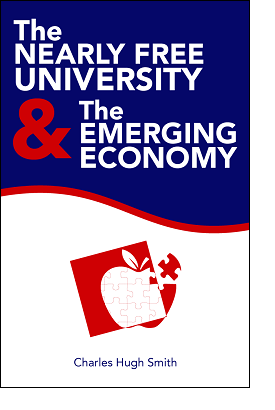Could Bitcoin (or equivalent) Become a Global Reserve Currency?
It's a worthy thought experiment to ask if a digital currency could also act as a reserve currency.
Could a non-state issued digital currency like Bitcoin become a global reserve currency? The idea came up in my recent conversation with Max Keiser on the Keiser Report during our discussion of reserve currencies.
The idea is intriguing on a number of levels. In terms of retaining value though thick and thin, the ultimate reserve currency cannot be printed (and thus devalued) with abandon by a government. Gold and silver have served as the ultimate reserve currency, as precious metals can be traded for commodities and services, provide collateral for debt and serve as reliable stores of value.
While many observers believe gold is still the only reliable reserve currency (or if you prefer, the only reliable backing for government-issued paper money), it's a worthy thought experiment to ask if a digital currency could also act as a reserve currency.
Since there is no real-world commodity backing the digital currency, its value must be based on scarcity and its ubiquity as money. The two ideas are self-reinforcing: there must be demand for the digital money to create scarcity, and the source of demand is the digital currency's acceptance as money that can be used to buy commodities, goods, services and (the ultimate test) gold.
It follows that the first step in a non-state issued digital currency becoming a reserve currency is that it isn't created in quantities that dwarf demand. If the digital currency is issued with abandon, it cannot be scarce enough to gain any value. If I own one quatloo (our hypothetical digital currency) and a trillion new quatloos are issued tomorrow, the value of my one quatloo will decline to near-zero.
The second step is its widespread acceptance globally as money, i.e. a store of value and something which can be traded for goods and services.
There is a bit of a built-in conflict in these two requirements. To be useful in the $60 trillion global economy, the quatloo must be issued in size: there must be enough of it around to grease transactions large and small in all sorts of markets. Using the U.S. dollar as a guide (since the USD is the primary reserve currency), we can estimate that a minimum of $1 trillion in quatloos would be needed to become a practical global currency.
To act as a reserve currency, another trillion or two would be needed, as nations would hold these quatloos as reserves. (Nations hold an estimated $7 trillion in USD reserves, about $3 trillion euros and $1 trillion or so in yen, pounds and other currencies.)
But issuing quatloos in these quantities would remove any scarcity value. Thus the issuer of the quatloo would have to carefully issue more quatloos only when demand justified the need for more monetary "grease" for the global economy.
If on the other hand skyrocketing demand/scarcity drove the value to the stratosphere, holders of the quatloo would rejoice, but this volatility would present its own set of risks for those seeking to use the quatloo as a reserve against currency volatility in the home-country currency. If a digital currency can leap ten-fold in a short time, then might it not drop with equal volatility?
Volatility is the enemy of reserves; the holder of reserves needs a liquid (meaning it can easily be sold or traded in size) currency that predictably retains its value. A volatile currency poses risks, as do currencies that cannot be traded in size without drastically influencing the market value of the currency.
These conditions pose a steep challenge for any digital currency, but they are not insurmountable. Even as a niche currency, non-state issued digital currencies could play a role in the global economy, especially if government-issued fiat currencies destabilize/ devalue due to massive money creation by desperate central banks and state treasuries.
Is scarcity enough to back a non-state issued currency? Bitcoin offers a real-world experiment.
Keiser Report: State Sanctioned Profits Max, Stacy and guest CHS cover a wide range of topics...
The Nearly Free University and The Emerging Economy:
The Revolution in Higher Education
Reconnecting higher education, livelihoods and the economy

We must thoroughly understand the twin revolutions now fundamentally changing our world: The true cost of higher education and an economy that seems to re-shape itself minute to minute.
Things are falling apart--that is obvious. But why are they falling apart? The reasons are complex and global. Our economy and society have structural problems that cannot be solved by adding debt to debt. We are becoming poorer, not just from financial over-reach, but from fundamental forces that are not easy to identify. We will cover the five core reasons why things are falling apart:
 1. Debt and financialization
1. Debt and financialization2. Crony capitalism
3. Diminishing returns
4. Centralization
5. Technological, financial and demographic changes in our economy
Complex systems weakened by diminishing returns collapse under their own weight and are replaced by systems that are simpler, faster and affordable. If we cling to the old ways, our system will disintegrate. If we want sustainable prosperity rather than collapse, we must embrace a new model that is Decentralized, Adaptive, Transparent and Accountable (DATA).
We are not powerless. Once we accept responsibility, we become powerful.
Kindle: $9.95 print: $24
| Thank you, Michael J. ($50), for your stupendously generous contribution to this site-- I am greatly honored by your support and readership. |



























